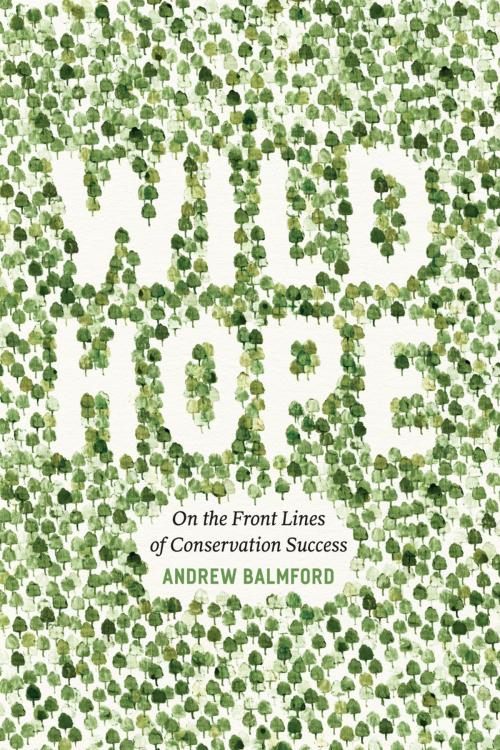Wild Hope
On the Front Lines of Conservation Success
Nonfiction, Science & Nature, Science, Earth Sciences, Biological Sciences| Author: | Andrew Balmford | ISBN: | 9780226036007 |
| Publisher: | University of Chicago Press | Publication: | June 7, 2012 |
| Imprint: | University of Chicago Press | Language: | English |
| Author: | Andrew Balmford |
| ISBN: | 9780226036007 |
| Publisher: | University of Chicago Press |
| Publication: | June 7, 2012 |
| Imprint: | University of Chicago Press |
| Language: | English |
Tropical deforestation. The collapse of fisheries. Unprecedented levels of species extinction. Faced with the plethora of gloom-and-doom headlines about the natural world, we might think that environmental disaster is inevitable. But is there any good news about the environment? Yes, there is, answers Andrew Balmford in Wild Hope, and he offers several powerful stories of successful conservation to prove it. This tragedy is still avoidable, and there are many reasons for hope if we find inspiration in stories of effective environmental recovery.
Wild Hope is organized geographically, with each chapter taking readers to extraordinary places to meet conservation’s heroes and foot soldiers—and to discover the new ideas they are generating about how to make conservation work on our hungry and crowded planet. The journey starts in the floodplains of Assam, where dedicated rangers and exceptionally tolerant villagers have together helped bring Indian rhinos back from the brink of extinction. In the pine forests of the Carolinas, we learn why plantation owners came to resent rare woodpeckers—and what persuaded them to change their minds. In South Africa, Balmford investigates how invading alien plants have been drinking the country dry, and how the Southern Hemisphere’s biggest conservation program is now simultaneously restoring the rivers, saving species, and creating tens of thousands of jobs. The conservation problems Balmford encounters are as diverse as the people and their actions, but together they offer common themes and specific lessons on how to win the battle of conservation—and the one essential ingredient, Balmford shows, is most definitely hope.
Wild Hope, though optimistic, is a clear-eyed view of the difficulties and challenges of conservation. Balmford is fully aware of failed conservation efforts and systematic flaws that make conservation difficult, but he offers here innovative solutions and powerful stories of citizens, governments, and corporations coming together to implement them. A global tour of people and programs working for the planet, Wild Hope is an emboldening green journey.
Tropical deforestation. The collapse of fisheries. Unprecedented levels of species extinction. Faced with the plethora of gloom-and-doom headlines about the natural world, we might think that environmental disaster is inevitable. But is there any good news about the environment? Yes, there is, answers Andrew Balmford in Wild Hope, and he offers several powerful stories of successful conservation to prove it. This tragedy is still avoidable, and there are many reasons for hope if we find inspiration in stories of effective environmental recovery.
Wild Hope is organized geographically, with each chapter taking readers to extraordinary places to meet conservation’s heroes and foot soldiers—and to discover the new ideas they are generating about how to make conservation work on our hungry and crowded planet. The journey starts in the floodplains of Assam, where dedicated rangers and exceptionally tolerant villagers have together helped bring Indian rhinos back from the brink of extinction. In the pine forests of the Carolinas, we learn why plantation owners came to resent rare woodpeckers—and what persuaded them to change their minds. In South Africa, Balmford investigates how invading alien plants have been drinking the country dry, and how the Southern Hemisphere’s biggest conservation program is now simultaneously restoring the rivers, saving species, and creating tens of thousands of jobs. The conservation problems Balmford encounters are as diverse as the people and their actions, but together they offer common themes and specific lessons on how to win the battle of conservation—and the one essential ingredient, Balmford shows, is most definitely hope.
Wild Hope, though optimistic, is a clear-eyed view of the difficulties and challenges of conservation. Balmford is fully aware of failed conservation efforts and systematic flaws that make conservation difficult, but he offers here innovative solutions and powerful stories of citizens, governments, and corporations coming together to implement them. A global tour of people and programs working for the planet, Wild Hope is an emboldening green journey.















